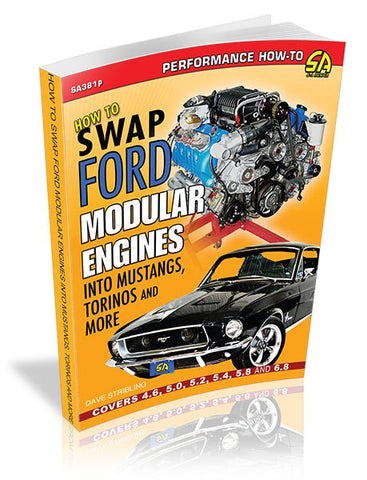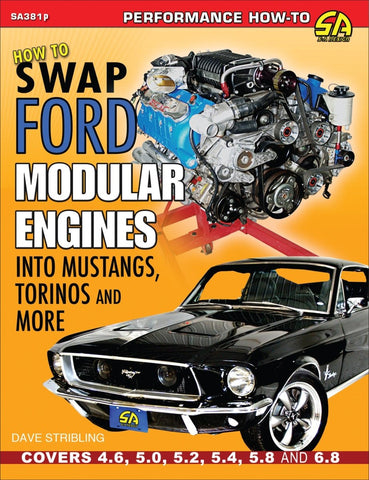The photos in this edition are black and white.
Learn the tips and tricks to swap a Ford modular engine into your Mustang or Torino by using the knowledgeable instruction from this book.
Author Dave Stribling covers motor-mount selection and fabrication, suspension and chassis modifications, aftermarket suspension options, firewall and transmission tunnel modifications, engine management and wiring procedures, fuel systems, exhaust systems, electrical mods and upgrades, and much more.
Stribling specializes in modular engine swaps and expertly guides you through each crucial step of the engine transplant process. Because of the large physical size, many components (such as brake boosters, steering rods and boxes, and other underhood components) may need repositioning or modification to co-exist in the engine bay. Many older Ford muscle and performance cars are prime candidates for a modular swap; however, shock towers protrude into the engine bay of these cars, so modifications are necessary to fit the engine into the car, which is also covered here.
The Ford modular engine is a popular swap for 1964-1/2-1973 Mustangs, Fox-Body Mustangs, trucks, hot rods, and other muscle cars because these high-tech engines provide exceptional performance and improved economy compared to their dated counterparts. Found in Mustangs and other Fords since the 1990s, installing a modular engine in a classic Ford infuses new technology and all the benefits that come with it into a classic car. Modular engines feature an overhead cam design that has massive horsepower potential, and are offered in 4.6-, 5.0-, 5.2- 5.4-, and 5.8-liter iterations. These high-tech 2-, 3-, and 4-valve engines are readily available as a crate engine, as well as from salvage yards, and in running cars. This engine design has a large physical footprint, and swapping the engine requires a thorough plan, using the proper tools and facilities.
Swapping the engine and transmission into a muscle car or truck requires specialized processes, and this insightful, explanatory, and detailed instruction is found only in this book. If you are considering swapping one of these high-tech engines into a non-original chassis, this book is a vital component to the process.r
Acknowledgments
Introduction
Chapter 1: Modular Engines: A Brief History
Performance History
Swap Spotlight: The Mustang in Black
Chapter 2: Modular Engine Features and Identification
Assembly Plant
Engine Identification
Vehicle VIN
Engine Tags
Engine Block Displacement
Cylinder Heads
Crankshafts
Intakes
Summary
Transmissions
Ford Crate Engines
Aftermarket Parts
Swap Spotlight: The Mustang Evolution
Chapter 3: Installing the Modular Engine in a Project Car
Engine Dimensions and Weights
Frame versus Unibody
Front Suspension Systems
Guidelines for Selecting the Right Suspension
Early Mustang Suspension
Mustang II Suspension
Strut Suspensions
Fox-Body Mustangs and Thunderbirds
Other Designs
Engine Mounts
Isolators
Oiling System
Steering System
Power Brakes
Swap Spotlight: One Bad Kat
Chapter 4: Powertrain Control Modules and Wiring
Factory Systems Overview
Ford Wiring and Connectors
PATS
Throttle-by-Wire
Returnless Fuel System
Variable Camshaft Timing (VCT and TI-VCT)
Ford PCM Communication
Reading Error Codes
Scan Tools and Data Loggers
Programmers
Factory Wiring Notes
Ford Performance Power Parts Control Pack
Aftermarket Computer Systems
Spotlight Build: 1967 Pro/Street Cobra Mustang Coupe
Chapter 5: Intakes and Induction
Factory Intake Manifold Considerations
Intake Manifold
Throttle Body
Intake Air Temperature Sensor
Mass Airflow Meter
Manifold Absolute Pressure Sensor
Intake Tubing and Filters
Swap Spotlight: Double Trouble
Chapter 6: Fuel Systems
Returnless versus Mechanical Return Line Fuel Systems
Aftermarket Fuel-Bypass Regulators
Single versus Dual Fuel Pumps
Aftermarket Fuel Pumps
Fuel Pump Voltage Boosters
Fuel Injectors and Rails
Fuel Filters
Fuel Tanks
Hoses and Fittings
EVAP System
Drive-by-Wire Gas Pedal
Swap Spotlight: Factory Five Cobra
Chapter 7: Cooling, Ignition and Engine Systems
Cooling System
Sensors
Pulleys
Alternators and Upgrades
Air Conditioning
Instrumentation
Swap Spotlight: 1952 International Pickup
Chapter 8: Transmission and Drivetrain
Factory Manual Transmissions
Aftermarket Manual Transmissions
Factory Automatic Transmissions
Aftermarket Automatic Transmissions
Transmission Crossmembers and Designs
Aftermarket Controllers
Shifters
Flywheels, Clutches and Pilot Bearings
Bellhousing and Adapters
Clutch Actuation
Driveshafts
Swap Spotlight: Coyote Swap into a Fox-Body Mustang
Chapter 9: Exhaust System
Factory Exhaust Manifolds
Aftermarket Exhaust Manifolds and Headers
Conversion Headers and Header Components
Catalytic Converters
Oxygen Sensors
Cat-Back Exhaust
Swap Spotlight: 1968 Torino
Chapter 10: Startup Tips for Success
Swap Spotlight: 1976 Ford F-100
Glossary
Source Guide
The photos in this edition are black and white.
Learn the tips and tricks to swap a Ford modular engine into your Mustang or Torino by using the knowledgeable instruction from this book.
Author Dave Stribling covers motor-mount selection and fabrication, suspension and chassis modifications, aftermarket suspension options, firewall and transmission tunnel modifications, engine management and wiring procedures, fuel systems, exhaust systems, electrical mods and upgrades, and much more.
Stribling specializes in modular engine swaps and expertly guides you through each crucial step of the engine transplant process. Because of the large physical size, many components (such as brake boosters, steering rods and boxes, and other underhood components) may need repositioning or modification to co-exist in the engine bay. Many older Ford muscle and performance cars are prime candidates for a modular swap; however, shock towers protrude into the engine bay of these cars, so modifications are necessary to fit the engine into the car, which is also covered here.
The Ford modular engine is a popular swap for 1964-1/2-1973 Mustangs, Fox-Body Mustangs, trucks, hot rods, and other muscle cars because these high-tech engines provide exceptional performance and improved economy compared to their dated counterparts. Found in Mustangs and other Fords since the 1990s, installing a modular engine in a classic Ford infuses new technology and all the benefits that come with it into a classic car. Modular engines feature an overhead cam design that has massive horsepower potential, and are offered in 4.6-, 5.0-, 5.2- 5.4-, and 5.8-liter iterations. These high-tech 2-, 3-, and 4-valve engines are readily available as a crate engine, as well as from salvage yards, and in running cars. This engine design has a large physical footprint, and swapping the engine requires a thorough plan, using the proper tools and facilities.
Swapping the engine and transmission into a muscle car or truck requires specialized processes, and this insightful, explanatory, and detailed instruction is found only in this book. If you are considering swapping one of these high-tech engines into a non-original chassis, this book is a vital component to the process.r
Acknowledgments
Introduction
Chapter 1: Modular Engines: A Brief History
Performance History
Swap Spotlight: The Mustang in Black
Chapter 2: Modular Engine Features and Identification
Assembly Plant
Engine Identification
Vehicle VIN
Engine Tags
Engine Block Displacement
Cylinder Heads
Crankshafts
Intakes
Summary
Transmissions
Ford Crate Engines
Aftermarket Parts
Swap Spotlight: The Mustang Evolution
Chapter 3: Installing the Modular Engine in a Project Car
Engine Dimensions and Weights
Frame versus Unibody
Front Suspension Systems
Guidelines for Selecting the Right Suspension
Early Mustang Suspension
Mustang II Suspension
Strut Suspensions
Fox-Body Mustangs and Thunderbirds
Other Designs
Engine Mounts
Isolators
Oiling System
Steering System
Power Brakes
Swap Spotlight: One Bad Kat
Chapter 4: Powertrain Control Modules and Wiring
Factory Systems Overview
Ford Wiring and Connectors
PATS
Throttle-by-Wire
Returnless Fuel System
Variable Camshaft Timing (VCT and TI-VCT)
Ford PCM Communication
Reading Error Codes
Scan Tools and Data Loggers
Programmers
Factory Wiring Notes
Ford Performance Power Parts Control Pack
Aftermarket Computer Systems
Spotlight Build: 1967 Pro/Street Cobra Mustang Coupe
Chapter 5: Intakes and Induction
Factory Intake Manifold Considerations
Intake Manifold
Throttle Body
Intake Air Temperature Sensor
Mass Airflow Meter
Manifold Absolute Pressure Sensor
Intake Tubing and Filters
Swap Spotlight: Double Trouble
Chapter 6: Fuel Systems
Returnless versus Mechanical Return Line Fuel Systems
Aftermarket Fuel-Bypass Regulators
Single versus Dual Fuel Pumps
Aftermarket Fuel Pumps
Fuel Pump Voltage Boosters
Fuel Injectors and Rails
Fuel Filters
Fuel Tanks
Hoses and Fittings
EVAP System
Drive-by-Wire Gas Pedal
Swap Spotlight: Factory Five Cobra
Chapter 7: Cooling, Ignition and Engine Systems
Cooling System
Sensors
Pulleys
Alternators and Upgrades
Air Conditioning
Instrumentation
Swap Spotlight: 1952 International Pickup
Chapter 8: Transmission and Drivetrain
Factory Manual Transmissions
Aftermarket Manual Transmissions
Factory Automatic Transmissions
Aftermarket Automatic Transmissions
Transmission Crossmembers and Designs
Aftermarket Controllers
Shifters
Flywheels, Clutches and Pilot Bearings
Bellhousing and Adapters
Clutch Actuation
Driveshafts
Swap Spotlight: Coyote Swap into a Fox-Body Mustang
Chapter 9: Exhaust System
Factory Exhaust Manifolds
Aftermarket Exhaust Manifolds and Headers
Conversion Headers and Header Components
Catalytic Converters
Oxygen Sensors
Cat-Back Exhaust
Swap Spotlight: 1968 Torino
Chapter 10: Startup Tips for Success
Swap Spotlight: 1976 Ford F-100
Glossary
Source Guide










